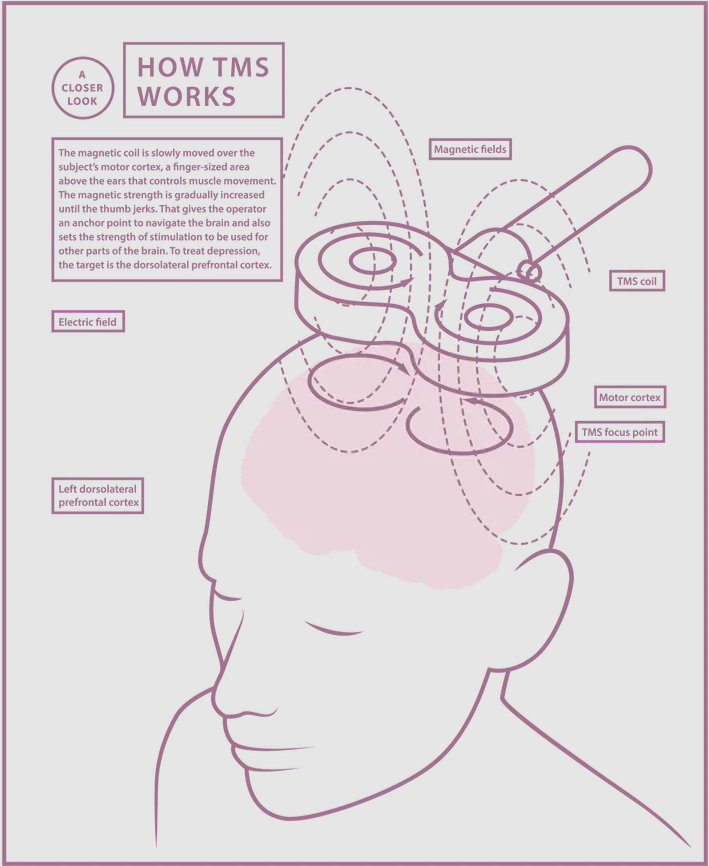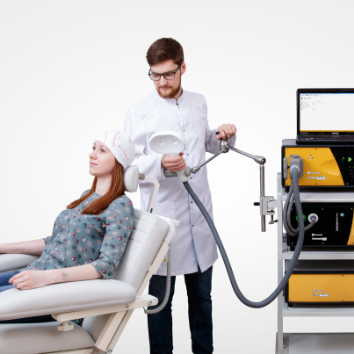Transcranial Magnetic Stimulation
TMS is a breakthrough in mental health treatment. It gives new hope and opportunities for people who have suffered for a long time without finding relief. TMS is non-invasive, does not cause systemic side effects, and is FDA approved (for some conditions and more to come). TMS is a hopeful and innovative way to heal the brain from various problems.
What is TMS?
TMS therapy is a type of brain stimulation therapy that uses magnetic fields to stimulate nerve cells in the brain. It is mainly used to treat depression, especially when other treatments such as medication and psychotherapy have not worked. TMS therapy is noninvasive, meaning it does not involve surgery or anesthesia. TMS therapy can improve symptoms of depression, such as low mood, loss of interest, and hopelessness. It can also help with other conditions, such as ADHD, obsessive-compulsive disorder, anxiety, post-traumatic stress disorder, and some neurological disorders.
TMS uses magnetic pulses to target specific brain regions related to mood and other neurological conditions. The pulses go through the scalp without surgery and reach the exact areas with accuracy. The pulses create tiny electrical currents that turn on inactive brain cells and pathways, causing amazing effects in the brain.
The secret of TMS is its ability to change brain activity. By targeting specific regions, TMS affects the complex network of connected brain circuits that control emotions, thoughts, behaviors, and more. This change aims to make the brain work better and more balanced.
How Does It Work?
But how does TMS work? The answer is in the brain’s amazing ability to adjust and learn, called neuroplasticity. Through repeated and focused stimulation, TMS makes the brain form new and stronger connections and pathways. This neuroplasticity process allows the brain to rewire itself, improving the circuits.
Moreover, it is thought that TMS makes the brain release more neurotransmitters, the chemicals that help brain cells communicate. These neurotransmitters, such as serotonin, dopamine, and norepinephrine, are important for regulating mood and emotions. By increasing their levels and activity, TMS can improve the overall brain chemistry, leading to a more stable and positive mental state.
Conditions We Treat
Depression
Teen Depression
Geriatric Depression
Bipolar Disorder
Obsessive-Compulsive Disorder
Adult OCD
Adolescent / Child OCD
Anxiety
Generalized Anxiety Disorder
Post Traumatic Stress Disorder (PTSD)
ADD/ADHD
Child ADHD
Teen ADHD
Adult ADHD
Insomnia
Acute Insomnia
Chronic Insomnia
Cognitive Enhancement
For, but not limited to:
Students (High School/University/Graduate)
Professional Athletes
Business Professionals
Cloud TMS
At our office, Cloud TMS therapy is a safe and effective treatment for depression and Obsessive Compulsive Disorder (OCD). Cloud TMS therapy uses a cloud-based device that delivers magnetic pulses to the brain, targeting the areas that are involved in mood regulation and compulsive behaviors. Cloud TMS therapy is noninvasive, painless, and has minimal side effects. It is also convenient, as it can be accessed from any location with an internet connection and does not require any maintenance or calibration.
This form of TMS therapy has been proven to improve the symptoms and quality of life of many patients who did not benefit from medication or other treatments. If you are interested in Cloud TMS therapy, please contact us today to schedule a consultation and find out if this treatment is suitable for you.
Benefits of TMS Therapy
TMS is a breakthrough alternative for people with conditions which traditional treatments are no longer effective. Unlike its predecessor electroconvulsive therapy (ECT), TMS is completely non-invasive and comes with much fewer side effects . It also does not require sedation or anesthesia, nor is there any “recovery time”. Patients may drive home following a treatment session. Here are some additional benefits of TMS:
High success rate — considerably higher success rate than any other treatments.
Non-invasive — treatment is entirely external to the body.
Non-sedative — patients are completely awake and typically experience little discomfort.
Minimal to no side effects — the most common side effect is slight discomfort.
FDA approved (for some conditions) — the FDA recognizes TMS as safe and effective.
In clinical trials, less than 5% of people discontinued their TMS treatment due to adverse effects. One may experience slight pain or discomfort during the procedure. However, a very rare percentage of people may be at risk of seizures during treatment, depending on their mental condition. For some, such as people with non-removable implants, TMS may not be safe either. But this and other conditions will be discussed with your doctor before treatment.





